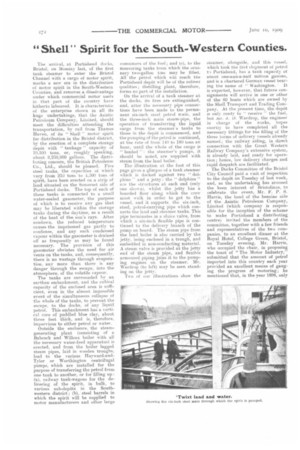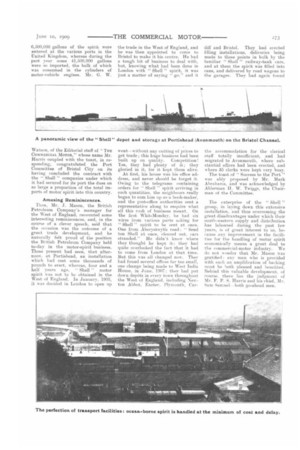" Shell " Spirit for the South-Western Counties.
Page 4

Page 5

If you've noticed an error in this article please click here to report it so we can fix it.
The arrival, at Portishead docks, Bristol, on Monday last, of the first tank steamer to enter the Bristol Channel with a cargo of motor spirit, marks a new era in the distribution of motor spirit in the South-Western Counties, and removes a disadvantage under which commercial motor users in that part of the country have hitherto laboured. it is characteristic of the enterprise shown in all its huge undertakings, that the Asiatic Petroleum Company, Limited, should meet the difficulties attending the transportation, by rail from Thames Haven, of its " Shell " motor spirit for distribution in the Bristol district, by the erection of a complete storage depot with "tankage " capacity of 10,500 tons, or, roughly speaking, about 3,250,000 gallons. The distributing concern, the British Petroleum Co., Ltd., should be pleased. Five steel tanks, the capacities of which vary from 250 tons to 4,300 tons of spirit, have been erected on a strip of land situated on the Somerset side of Portishead docks. Tile top of each of these tanks is connected to a small water-sealed gasometer, the purpose of which is to receive any gas that may be liberated within the storage tanks during the daytime, as a result of the heat of the sun's rays. After sonclown, the reduced temperature causes the imprisoned gas partly to condense, and any such condensed vapour within the gasometer is drained off as frequently as may be found necessary. The provision of this gasometer obviates the need for air vents on the tanks, and, consequently, there is no wastage through evaporation, any more than there is any danger through the escape, into the atmosphere, of the volatile vapour.
The tanks are surrounded by an earthen embankment, and the cubical capacity of the enclosed area is sufficient, even in the almost impossible event of the simultaneous collapse of the whole of the tanks, to prevent the escape, to the docks, of any liquid petrol. This embankment has a vertical core of puddled blue clay, about three feet thick, and is, therefore, impervious to either petrol or water.
Outside the enclosure, the steamgenerating plant (consisting of a Babcock and Willcox boiler with all the necessary water-feed apparatus) is erected, and from the boiler lagged steam pipes, laid in wooden troughs, lead to the various Hayward-andTyler , or Worthington centrifugal pumps, which are installed for the purpose of transferring the petrol from one tank to another, or for filling up : (a), railway tank-wagons for the delivering of the spirit, in bulk, to various sub-depots in the Southwestern district ; (b), steel barrels in which the spirit will be supplied to motor manufacturers and other large
consumers of the fuel ; and (c), to the measuring tanks from which the of-canary two-gallon tins may be filled. All the petrol which will reach the Portishead clepbt will be of the refined qualities ; distilling plant, therefore, forms no part of the installation.
On the arrival of a tank steamer at the docks, its fires are extinguished, and, alter the necessary pipe connections have been made to the permanent six-inch steel petrol main, and the three-inch main steam-pipe, the operation of transferring the liquid cargo from the steamer s tanks to those in the depot is commenced, and the pumping of the petrol is continued, at the rate of from 140 to 180 tons an hour, until the whole of the cargo is " landed " : the steamer's pumps, it should be noted, are supplied with steam from the land boiler.
The illustration at the foot of this page gives a glimpse of a tank steamer which is docked against two " dolphins " and a jetty ; the " dolphins " are the structures at each end (only one shown), whilst the jetty has a boarded floor along which the crew must walk in order to get to the vessel, and it supports the six-inch, steel, petrol-carrying pipe which connects the land and steamer tanks. This pipe terminates in a sluice valve, from which a six-inch flexible pipe is continued to the delivery branch of the pump on board. The steam pipe from the land boiler is also carried by the jetty, being enclosed in a trough, and embedded in non-conducting material. A steam valve is provided at the jetty end of the steam pipe, and flexible armoured piping joins it to the pumping engines on the steamer. Mr. Wardrop (to ]eft) may be seen standing on the jetty.
'Iwo of our illustrations show the steamer, alongside, and this vessel, which took the first shipment ol petrol ti Portishead, has a tank capacity of about one-and-a-half million gallons, and is a chartered German vessel bear
ing the name of Washington. It is expected, however, that future consignments will arrive in one or other of the 60 boats which are owned by the Shell Transport and Trading Conipany. At the present time, the depot is only ready to " receive the fuel, but. air. J. D. Wardrop, the engineer in charge of the works, hopes shortly to have completed all the necessary fittings for the filling of the three forms of uelivery vessels already named ; the railway siding, in direct connection with the Great Western Railway Company's extensive system, is already laid, and ready for operation; hence, low delivery charges and. rapid despatch are facilitated.
'Ile Docks Committee of the Bristol City Council paid a visit of inspection to the depot on Tuesday of last week, and, as the undertaking has aroused the keen interest of Bristolians, to celebrate the event, Mr. F. P. S. Harris, the head of the benzine side of the Asiatic Petroleum Company, Limited (which company is responsible for the inception of the scheme to make Portishead a distributing centre) invited the members of the committee, together with a few friends and representatives of the two companies, to an excellent dinner at the Royal Hotel, College Green, Bristol, on Tuesday evening. Mr. Harris, who occupied the chair, in proposing the toast of "The Motor Industry," submitted that the amount of petrol imported into this country each year provided an excellent means of gauging the progress of motoring ; he mentioned that, in the year 1898, only 6,500,000 gallons of the spirit were entered at the various ports in the United Kingdom, whereas during the past year some 41,500,000 gallons were so imported, the bulk of which was consumed in the cylinders of motor-vehicle engines. Mr. G. W.
Watson, of the Editorial staff of "THE COMNIERCIAL MOTOR," whose name Mr. Harris coupled with the toast, in responding, congratulated the Port Committee of Bristol City on its having concluded the contract with the " Shell " companies under which it had secured for its port the dues on so large a proportion of the total imports of motor spirit into this country.
Amusing Reminiscences.
Then, Mr. J. Mason, the British Petroleum Company's manager for the West of England, recounted some interesting reminiscences, and, in the course of a clever speech, said that the occasion was the outcome of a great trade development, and he naturally felt proud of the position the British Petroleum Company held to-day in the motor-spirit business. Those present had seen, that afternoon. at Portishead, an installation which had cost some thousands of pounds to erect, whereas, four and a half years ago, '' Shell " motor spirit was not to be obtained in the West of England. In January, 1905, it was decided in London to open tip the trade in the West of England, and he was then appointed to come to Bristol to make it his centre. He had a tough bit of business to deal with, but, knowing what had been done in London with " Shell " spirit, it was just a matter of saying go." and it went—without any cutting of prices to get trade; this huge business had been built up on quality. Competition! Yes, they had plenty of it; they gloried in it, for it kept them alive.
At first, his house was his office address, and never should he forget it. Owing to the telegrams containing orders for " Shell " spirit arriving in such quantities, the neighbours really began to sum him up as a book-maker, and the post-office authorities sent a representative along to enquire what all this rush of business meant. On the first Whit-Monday, he had six wires from various parts a;-,king for " Shell" spirit to be sent at once. One from Aberystwyth read : " Send ton Shell at once, cleared out, ears stranded." Be didn't know where they thought he kept it they had quite overlooked the fact that it had to come from London at that time. But this was all changed now. They had found several offices far too small, one change being made to West India House, in June, 1907 ; they had put down depots in every town throughout the West of England, including Newton Abbot, Exeter, Plymouth, Car
diff and Bristol. They had erected filling installations, deliveries being made to these points in bulk by the familiar " Shell " railway-tank cars, and at them the spirit was filled into cans, and delivered by road wagons to the garages. They had again found the accommodation for the clerical staff totally insufficient, and had migrated to Avonmouth, where substantial offices had been erected, and where 35 clerks were kept very busy.
The toast of " Success to the Port " was ably proposed by Mr. Mark Abrahams, and was acknowledged by Alderman H. W. Twiggs, the Chairman of the Committee.
The enterprise of the " Shell " group, in laying down this extensive installation, and thus overcoming the great disadvantages under which their south-western supply and distribution has laboured during the past few years, is of great interest to us, because any improvement in the facilities for the handling of motor spirit economically means a great deal to the commercial-motor industry. We do not wonder that Mr. MRSOR was gratified : any man who is provided with such an amplification of backing must he both pleased and benefited. Behind this valuable development, of course, there lies the judgment of Mr. F. P. S. Harris and his chief, Mr. Sam Samuel—both go-ahead men.






















